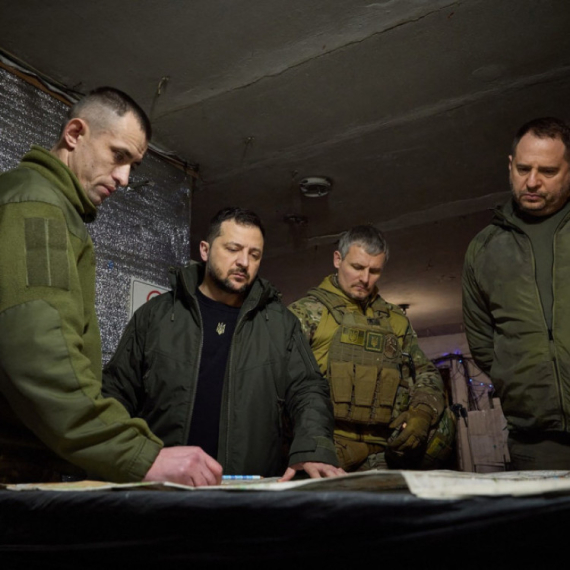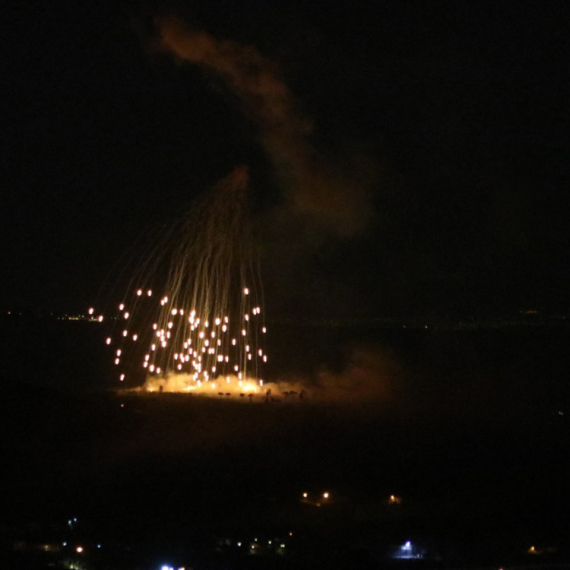Spain: Allegations of ETA role in 2004 attacks
Spanish parties are once again debating whether ETA was involved in the March 11, 2004 terror attacks in Madrid.
Friday, 02.11.2007.
18:43

Spanish parties are once again debating whether ETA was involved in the March 11, 2004 terror attacks in Madrid. As judicial experts and victims of the Madrid train bombings questioned the acquittal of several key defendants in the plot, Spain's political factions turned quickly Thursday to bickering over a conspiracy theory holding that ETA, the Basque militant group, had a hand in the attacks. Spain: Allegations of ETA role in 2004 attacks The question of ETA's involvement dominated newspaper headlines and prompted an exchange of barbs between the governing Socialist party, which rebuts the theory, and the Popular Party, some of whose leaders espouse it. Since bombs ripped through four crowded commuter trains March 11, 2004, killing 191 people and wounding more than 1,800, Spain has been fiercely divided between those who suspect ETA played a part in the attacks and those who do not. José Maria Aznar, the prime minister at the time, immediately pointed the finger at ETA and retained his stance for days, despite mounting evidence that the attack was the work of Islamists. A disenchanted public punished Aznar on March 14, 2004, when it voted his conservative Popular Party out of power. In his verdict Wednesday, Javier Gómez Bermudez, head of a tribunal trying 29 defendants for their alleged role in the attacks, clearly attributed the bombings to a group of Islamists and dismissed the possibility that ETA had been involved. In a country where the role of victims has become highly politicized, the conspiracy theory spread to the victims of the Madrid bombings, prompting bitter divisions between different victims associations. "We are happy, at least, that the conspiracy theory has been buried," Jésus Ramírez, a leader of the Association for Victims of the 11-M, said by telephone Thursday. Ramírez said the association was studying the possibility of appealing some of the tribunal's verdict, which absolved several key defendants in the bombings and convicted only three of eight defendants facing murder charges. Ramírez said one of the decisions that had most dismayed victims was the acquittal of Antonio Toro Castro, brother-in-law of José Emilio Suárez Trashorras, a former miner convicted of supplying the explosives used in the attacks. Toro Castro allegedly helped negotiate the sale of the explosives. Trashorras's wife, Carmen Toro Castro, was also acquitted, despite evidence she went to several meetings with Islamists at which the explosives were discussed. Victims and legal experts Thursday also questioned the judges' decision to sentence Rafa Zouhier, a former drug dealer who acted as a go-between in the purchase of the explosives, to only 10 years in prison. The tribunal ruled that Zouhier did not know the "specific" use to which the explosives would be put. Paula Garcia, a lawyer who represented the Association for Victims of the 11-M during the trial, described the decisions as "unbelievable." "Zouhier was fundamental to the sale of explosives," she said, while acknowledging that under Spanish law defendants can argue that they did not know the exact intentions of the criminals they were aiding. "Our law is very old," she added. Although the verdict rejected the involvement of ETA, Mariano Rajoy, leader of the opposition Popular Party, seized on the fact that none of the alleged masterminds of the plot had been convicted to call for fresh investigations. In response, Alfredo Pérez Rubalcaba, the current interior minister, invited Rajoy on Thursday to "repeat with me: it was not ETA." Jesús Blanco, general secretary of the ruling Socialist party, called Aznar the "mastermind of mass deceit" on Thursday. Echoing the language used to describe the convicted terrorists, Blanco branded Ángel Acebes, Aznar's minister of the interior, "material author" of the conspiracy and Rajoy a "necessary accomplice."
Spain: Allegations of ETA role in 2004 attacks
The question of ETA's involvement dominated newspaper headlines and prompted an exchange of barbs between the governing Socialist party, which rebuts the theory, and the Popular Party, some of whose leaders espouse it.Since bombs ripped through four crowded commuter trains March 11, 2004, killing 191 people and wounding more than 1,800, Spain has been fiercely divided between those who suspect ETA played a part in the attacks and those who do not.
José Maria Aznar, the prime minister at the time, immediately pointed the finger at ETA and retained his stance for days, despite mounting evidence that the attack was the work of Islamists.
A disenchanted public punished Aznar on March 14, 2004, when it voted his conservative Popular Party out of power.
In his verdict Wednesday, Javier Gómez Bermudez, head of a tribunal trying 29 defendants for their alleged role in the attacks, clearly attributed the bombings to a group of Islamists and dismissed the possibility that ETA had been involved.
In a country where the role of victims has become highly politicized, the conspiracy theory spread to the victims of the Madrid bombings, prompting bitter divisions between different victims associations.
"We are happy, at least, that the conspiracy theory has been buried," Jésus Ramírez, a leader of the Association for Victims of the 11-M, said by telephone Thursday.
Ramírez said the association was studying the possibility of appealing some of the tribunal's verdict, which absolved several key defendants in the bombings and convicted only three of eight defendants facing murder charges.
Ramírez said one of the decisions that had most dismayed victims was the acquittal of Antonio Toro Castro, brother-in-law of José Emilio Suárez Trashorras, a former miner convicted of supplying the explosives used in the attacks.
Toro Castro allegedly helped negotiate the sale of the explosives. Trashorras's wife, Carmen Toro Castro, was also acquitted, despite evidence she went to several meetings with Islamists at which the explosives were discussed.
Victims and legal experts Thursday also questioned the judges' decision to sentence Rafa Zouhier, a former drug dealer who acted as a go-between in the purchase of the explosives, to only 10 years in prison. The tribunal ruled that Zouhier did not know the "specific" use to which the explosives would be put.
Paula Garcia, a lawyer who represented the Association for Victims of the 11-M during the trial, described the decisions as "unbelievable."
"Zouhier was fundamental to the sale of explosives," she said, while acknowledging that under Spanish law defendants can argue that they did not know the exact intentions of the criminals they were aiding. "Our law is very old," she added.
Although the verdict rejected the involvement of ETA, Mariano Rajoy, leader of the opposition Popular Party, seized on the fact that none of the alleged masterminds of the plot had been convicted to call for fresh investigations.
In response, Alfredo Pérez Rubalcaba, the current interior minister, invited Rajoy on Thursday to "repeat with me: it was not ETA."
Jesús Blanco, general secretary of the ruling Socialist party, called Aznar the "mastermind of mass deceit" on Thursday.
Echoing the language used to describe the convicted terrorists, Blanco branded Ángel Acebes, Aznar's minister of the interior, "material author" of the conspiracy and Rajoy a "necessary accomplice."














































Komentari 0